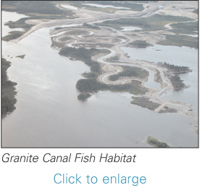|
Hydro completed construction of the Granite Canal Hydroelectric Development during the summer of
2003 and commenced formal operation of the facility in August. As part of the environmental assessment
for the project, fish and caribou were identified as the two significant environmental aspects. To
address concerns associated with these, Hydro committed to compensating for 444 units
(100 m2 = 1 unit)
of salmonid spawning and rearing habitat that would be altered, disrupted or destroyed as part of
the project and to monitor migration of the Buchan's Plateau Caribou Herd in the vicinity of the
Project site.
GRANITE CANAL FISH HABITAT COMPENSATION FACILITY
 Environmental assessment of the Project identified that a principle spawning area for fish inhabiting
Meelpaeg Lake would be de-watered. To compensate for the habitat to be altered, disrupted or destroyed,
Hydro incorporated construction of 444 units of salmonid spawning and rearing habitat into the project
design.
Environmental assessment of the Project identified that a principle spawning area for fish inhabiting
Meelpaeg Lake would be de-watered. To compensate for the habitat to be altered, disrupted or destroyed,
Hydro incorporated construction of 444 units of salmonid spawning and rearing habitat into the project
design.
The Fish Habitat Compensation Facility (FHCF) that was constructed included a main channel and two side
channels, called Compensation Creek, totaling 297 units of habitat designed for utilization by ouananiche
and brook trout. Habitat constructed in the tailrace delta consisted of 139 units. A small diversion
channel contained eight units of habitat designed for brook trout utilization, and fish passage to a
residual watershed containing 23 units of salmonid spawning and rearing habitat.
Immediately upon completion of construction of the FHCF, Hydro implemented a monitoring program
designed to confirm the structural stability of the facilities and their utilization by landlocked salmon
and brook trout. Initial, non-intrusive, biological and physical monitoring commenced during the fall of
2003. Initial monitoring confirmed utilization of Compensation Creek and the tailrace delta habitat by
salmonids for spawning. The comprehensive biological and physical monitoring program will commence
during 2004. Monitoring will continue for at least six years.
Recent correspondence from the Regional Director General for DFO, Newfoundland Region to Hydro stated
development and implementation of the Granite Canal Fish Habitat Compensation Facility has been
depicted as an exceptional example of Hydro's commitment towards ensuring the conservation and
protection of fish and fish habitat in the Province and throughout the country.
BUCHAN'S PLATEAU CARIBOU HERD MONITORING
As part of the Environmental Assessment for the project, Hydro monitored migration of the Buchan's
Plateau Caribou Herd in the vicinity of the project site for two years prior to construction, and
monitoring continued during the three years of construction. Hydro is also committed to monitoring two
years post-construction. The herd's annual migration is from the south coast of Newfoundland between
Bay d'Espoir and LaPoile to the Buchan's Plateau, which is known to be their principle calving grounds.
This annual migration to and from these areas is approximately seven to nine kilometers west of the
project site. Straggler caribou are present in the project area for much of the year.
Results from the construction phase monitoring of the herd have been compared to the pre-construction
data. This comparison indicated that the migration patterns during the pre-construction and construction
periods remained similar, and that construction activity had little or no effect on migration through the
project area. Monitoring data collected to date confirm the prediction during the environmental assessment
that impacts on caribou would be minor, insignificant, direct, negative and short term. Post-construction
monitoring data collected will continue to be compared with earlier findings.
|
